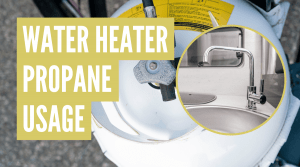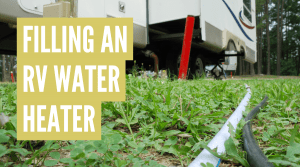When deciding if you should leave your RV water heater on all the time, you need to consider safety, fuel consumption, and wear and tear on your heater.
Oh, and in some cases, the legality of leaving it on!
This is a hot topic in the camping world with varying opinions, so let’s look at the facts.
By the end of this article, you will better understand whether you should leave your RV water heater on all the time or shut it off at certain times.
Can I Leave My RV Water Heater on All the Time?
You can leave your RV water heater on all the time, whether it be propane or electric-powered, and whether you are traveling or at a campground.
The only times you need to turn it off are when you are draining your water heater and when going through tunnels that have signs posted requiring it. These are typically tunnels that slope down in the middle since propane gas is heavier than air and could potentially pool at the bottom.
With that said, there are more specific concerns RV owners have with leaving their water heater on all the time, including:
- Safety
- Fuel consumption
- Wear and tear
So, let’s look at each of these concerns a little closer.
Is It Safe to Leave My RV Water Heater on All the Time?
As far as safety goes, you can leave your electric and even propane-powered RV water heater on all the time with little to no worry.
The argument for turning the water heater off while traveling is that the movement can cause stress and loosen or break vital propane components, causing a leak and filling your RV with propane.
That point is hard to argue, but keep in mind that RV propane systems have several different safety features built in to prevent this from ever happening:
- An excess flow device that limits propane flow in case of a leak.
- A thermal bushing that melts when exposed to high temps, thus stopping the propane from flowing.
- A flame-proving sensor that shuts the propane gas off if it doesn’t “prove” it was lit right after lighting.
- RV propane detector that will immediately alert you once it detects a propane leak.
The likelihood of your propane tank exploding while driving because you left your water heater on is slim. But if you are risk-averse, you have every right to turn it off when traveling or even when not in use. The choice is yours.
Just remember, you should turn it off if you see posted signs stating so before entering a tunnel.
As far as leaving your RV water heater on all the time when at a campground, there are no additional safety risks. It’s really no different than leaving your water heater on at home.
Does It Waste Money to Leave My RV Water Heater On?
Running an RV water heater on propane or electricity all the time will lead to increased energy costs. But, since RV water heaters are so small compared to home water heaters, the cost is negligible (depending on the amount of use).
And if you can connect to shore power at the RV park, they will absorb what little electricity cost there might be (if running on electricity).
As far as operating on gas, let’s take a quick look at how much propane an RV water heater uses. It’s nearly impossible to get an accurate estimate since so many factors determine your water heater’s propane usage (how big it is, how much hot water you use, how well insulated the tank is, etc.). Still, we can get a ballpark estimate with a little math.
If you have a 20 lb. propane tank on your camper running a 6-gallon Suburban RV water heater rated at 10,000 BTU’s, you will get roughly 42 hours of continuous use! Keep in mind, your water heater doesn’t run continuously (only when it heats the water), and it only takes about 10-15 minutes to heat the water in the tank. So, if your water heater runs on average of an hour per day, it would take 42 days to go through your 20 lb. tank!
Some even argue that leaving your RV water heater on throughout the day, as opposed to continually flipping it on and off right before using it, is more cost-effective and safer for the unit.
What it really comes down to is cost vs. convenience. Some find it more convenient to leave the water heater on and absorb what little it may cost. In contrast, others want to save every penny and prefer to turn it off when not in use. Again, the choice is yours.
Does Leaving an RV Water Heater on Wear It Down Faster?
Leaving your RV water heater on will not create any noticeable wear and tear on the unit. It’s completely safe to leave it running all the time, just as you do with your residential water heater.
Again, some argue that continually flipping it on and off can create more wear and tear than simply leaving it on.
Either way, the choice is up to you.
Important: What can wear it down faster is turning an electric RV water heater on without water in the tank! The water in the tank draws the heat away from the heating element, thus preventing it from burning out. If there’s no water, the electric element will burn out very quickly. Check out our guide on how to turn on an electric water heater in an RV for more important information!
To make sure your RV’s hot water tank is full before turning it on:
- Double-check you don’t have your bypass valve on, which will essentially bypass the water around your hot water tank (used to winterize an RV).
- Then turn on the hot water faucets in your vehicle and ensure water is coming out. If water comes out, your water heater should be full of water.
- You can now safely turn on your electric water heater. If not, you will need to fill your water heater tank before turning it on. Check out our guide on how to fill an RV hot water heater for some important information.
In Summary
Ultimately, whether you should leave your RV water heater on all the time or shut it off at certain times, for example, at night or while traveling, is up to you. Some campers turn it off after every use, some turn it off while traveling, and some never turn it off (unless they aren’t using their motorhome for an extended period of time).
What are your thoughts? Let us know in the comments below.







If the weather is freezing outside – day and night – does leaving the water heater on all the time help to keep the pipes in the trailer from freezing? Thank you!
It would certainly help the water inside the tank from freezing but the water supply and delivery lines will still need to run through a heated area or they will freeze.